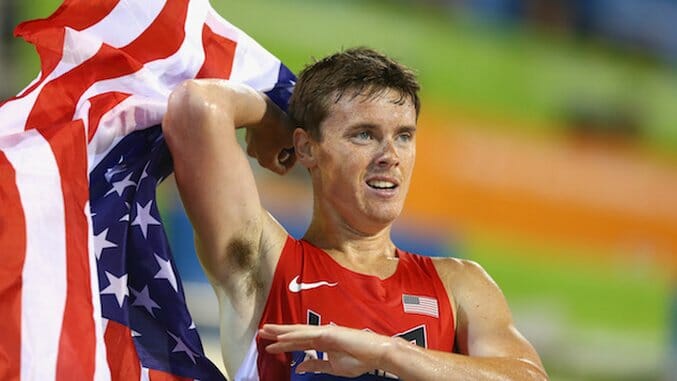Mikey Brannigan Wasn’t Allowed to Compete in College. Now, He’s Going for Gold in Rio.
Photos courtesy Getty Images
For Mikey Brannigan, the big race in Rio is just the latest stop in an already unprecedented journey.
Brannigan, a lanky 19-year-old Long Island native, is one of America’s fastest milers. Unlike many of his competitors in races throughout his short career, however, he has autism. Edie Brannigan, Mikey’s mother, said that she and her husband knew he had autism when he was 18 months old; he was officially diagnosed at two. Edie described her son as a “peer modeler” because he tries to overcome his autism in social settings by mimicking the people around him.
“We’re very blessed, and we always have been, that Mikey has a very profound awareness of his disability,” Edie said about her son. “He gets that he struggles in relationships and socializing, and he hates it. He’s always wanted to be just like any other kid.”
Kevin Brannigan, Mikey’s father, met Steve Cuomo when his son was seven years old. Cuomo told Kevin about Rolling Thunder, a running club he founded and coached that allows disabled athletes as young as five years old to train and compete with able-minded athletes. Mikey’s parents quickly signed him up.
“The running changed everything. He became a different kid,” Edie said. “Whether its endorphins or just getting out all the excess hyperactive energy that he has, it changed him completely.”
Through Rolling Thunder, Mikey began competing in road races as a young boy. These races gave a glimpse at the runner’s future success.
“First Mikey was coming in like 200th. Then Mikey was coming in like 100th. Then Mikey was coming in 50th. And then Mikey was coming in 20th. Well the next thing you know, Mikey’s winning every road race he goes into, practically,” Edie said.
“I mean he was 12 years old, and we went with Rolling Thunder as a team to Washington, D.C. for the Marine Corps 10k,” Edie said, telling the story of when she really knew her son had a real talent. “There’s something like 6,000 people in the race; Mikey comes in 22nd. He’s 12.”
Mikey quickly picked up a love for running and racing.
“I feel proud of myself,” Mikey said. “It’s a gift from God, and I work really hard for it.”
Edie thinks that her son’s autism has allowed him to progress as a runner without the inhibition of self-doubt.
-

-

-

-

-

-

-

-

-

-

-

-

-

-

-

-

-

-

-

-

-

-

-

-

-

-

-

-

-

-

-

-

-

-

-

-

-

-

-

-








































